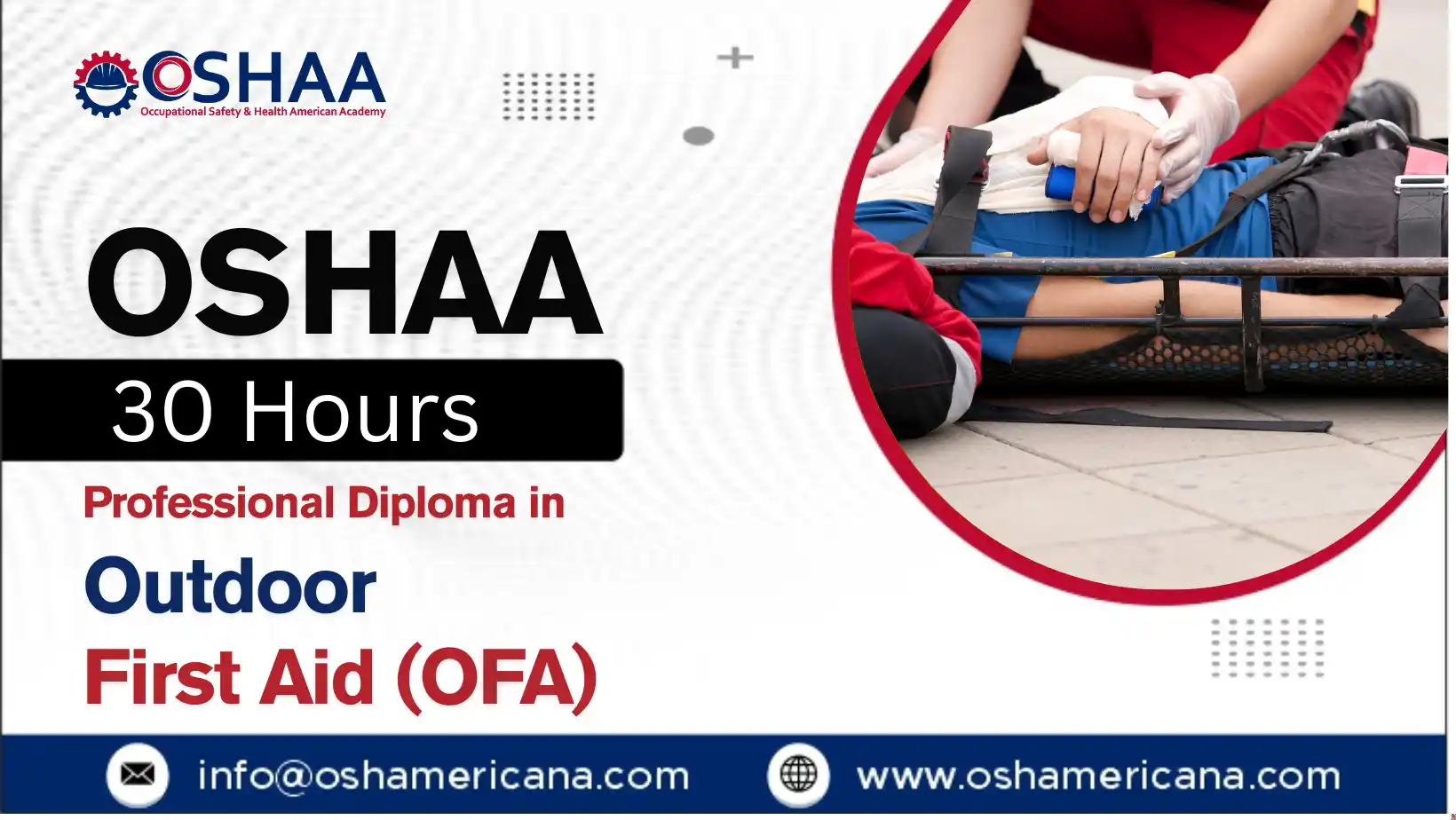OSHAA Certified 30-Hours Diploma in Outdoor First Aid (OFA)
The OSHAA 30-Hours Professional Diploma in Outdoor First Aid (OFA) is a specialised training programme designed to provide participants with the essential skills and knowledge required to deliver effective first aid care in outdoor and remote environments. Recognising the unique challenges posed by outdoor settings—such as limited access to medical facilities, variable weather conditions, and diverse terrain—this course equips participants to respond confidently and competently in emergencies that occur away from immediate professional help.
Offered by OSHAA, a reputable awarding body known for its commitment to high-quality health and safety education, this diploma meets international standards and is tailored for professionals and enthusiasts involved in outdoor activities. Whether working as adventure guides, outdoor educators, conservation workers, or recreational leaders, participants will gain critical first aid expertise relevant to their environment.
The course covers a broad spectrum of topics, including risk assessment, casualty evaluation, management of common injuries such as fractures and burns, environmental emergencies like hypothermia and heatstroke, and the use of lifesaving techniques such as CPR and automated external defibrillators (AED). Participants also learn how to improvise treatments using available resources, manage prolonged care situations, and coordinate emergency evacuations.
Emphasising practical skills and real-world scenarios, the training ensures participants are prepared to act decisively under pressure, prioritise care, and maintain safety in unpredictable outdoor conditions. By completing this diploma, participants will demonstrate their capability to provide competent first aid care, enhancing safety standards in their workplaces and communities.
This qualification not only improves personal confidence and readiness but also increases employability in sectors where outdoor safety is paramount. The OSHAA 30-Hours Professional Diploma in Outdoor First Aid is an invaluable credential for anyone committed to safeguarding lives in outdoor and remote environments.
OSHAA 30-Hours Professional Diploma in Outdoor First Aid (OFA)
Study Units
Learning Outcomes
Introduction to Outdoor First Aid and Legal Responsibilities (2 Hours)
- Understand the scope and importance of outdoor first aid
- Recognise legal and ethical responsibilities of a first aider in outdoor settings
- Identify key regulations and compliance requirements for outdoor first aid provision
Risk Assessment and Scene Management in Outdoor Environments (3 Hours)
- Conduct effective risk assessments specific to outdoor environments
- Manage emergency scenes safely and efficiently to protect casualties and responders
- Prioritise actions to minimise hazards in remote and natural settings
Casualty Assessment and Primary Survey Techniques (4 Hours)
- Perform comprehensive casualty assessments under outdoor conditions
- Conduct primary surveys to identify life-threatening conditions
- Adapt assessment techniques to limited resources and challenging environments
Cardiopulmonary Resuscitation (CPR) and Automated External Defibrillator (AED) Use (4 Hours)
- Demonstrate CPR techniques aligned with international guidelines
- Operate AED devices confidently during emergencies
- Integrate CPR and AED use in outdoor rescue scenarios effectively
Management of Bleeding, Wounds, and Shock Outdoors (4 Hours)
- Identify and control different types of bleeding in remote settings
- Apply appropriate wound care and dressing techniques outdoors
- Recognise and manage shock considering environmental factors
Treatment of Fractures, Sprains, and Soft Tissue Injuries (4 Hours)
- Identify common musculoskeletal injuries encountered outdoors
- Apply immobilisation and support methods, including improvised techniques
- Provide effective pain relief and care tailored to outdoor conditions
Environmental Emergencies: Hypothermia, Heatstroke, Dehydration, and Bites (4 Hours)
- Recognise signs and symptoms of environmental emergencies
- Administer correct first aid treatments for hypothermia, heatstroke, dehydration, and bites
- Implement prevention strategies to reduce environmental risks
Prolonged Casualty Care and Monitoring in Remote Settings (3 Hours)
- Manage casualties when evacuation is delayed or prolonged
- Monitor vital signs and observe changes in casualty condition over time
- Provide ongoing care and reassurance until advanced medical help arrives
Emergency Evacuation Procedures and Communication Skills (2 Hours)
- Plan and execute safe evacuation strategies in outdoor environments
- Use effective communication techniques to coordinate rescue efforts
- Understand the importance of teamwork and clear information exchange during emergencies
- Provides specialised knowledge and practical skills tailored for first aid in outdoor and remote environments
- Equips participants to confidently manage emergencies when professional medical help may be delayed
- Enhances ability to assess and treat common injuries and medical conditions specific to outdoor settings
- Develops competence in improvising first aid treatments using limited resources available in the field
- Strengthens skills to handle environmental emergencies such as hypothermia, heatstroke, dehydration, and animal bites
- Improves readiness for prolonged casualty care and effective monitoring in remote locations
- Builds expertise in emergency evacuation planning and clear communication during rescue operations
- Increases personal and professional safety awareness for outdoor workers, guides, and recreational enthusiasts
- Offers an internationally recognised qualification that supports career advancement in outdoor education, environmental work, and emergency response
- Encourages confidence and preparedness to deliver timely, potentially life-saving care in diverse outdoor situations
- Participants working as outdoor educators, adventure guides, and wilderness instructors
- Professionals involved in environmental conservation, forestry, and park services
- Rescue and emergency response personnel operating in remote or rugged terrain
- Recreational leaders, camp coordinators, and sports coaches managing outdoor activities
- Volunteers and staff engaged in community projects or outdoor events in natural settings
- Individuals who frequently participate in hiking, trekking, camping, or other outdoor pursuits
- Anyone seeking specialised first aid training designed for the unique challenges of outdoor emergencies
- Participants aiming to enhance their safety skills and qualifications for careers or personal preparedness in outdoor environments







